The phenomenon of "Taobao villages"
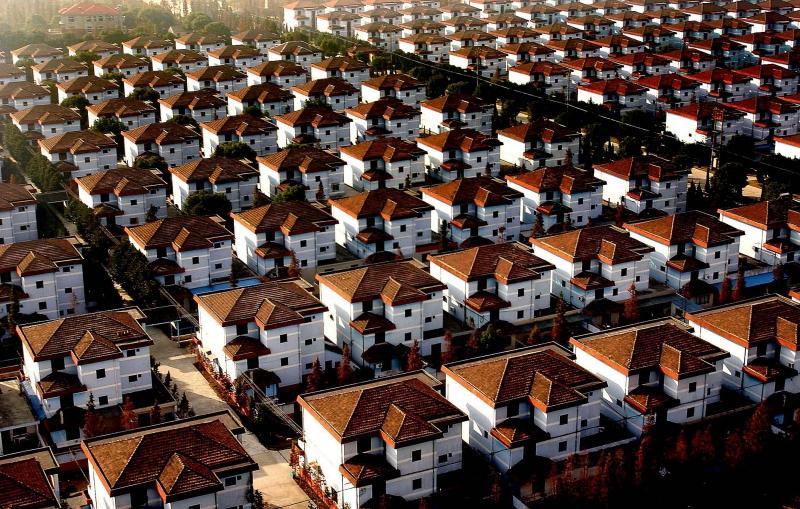
China is not only an industrial-economic boom and rapid urbanization. It is also a multimillion part of the population living in rural areas below the poverty line. It was among such Chinese villages that the phenomenon of settlements emerged, whose economy is entirely dependent on the production of goods sold by the largest Chinese online stores. This phenomenon is called " Taobao villages". Under the cut a story about how and how modern Chinese villagers live. If you are doing well with English, the original text can be read here . I would like, of course, to talk about something similar from Russian reality, but so far only Gus-Khrustalny, Gzhel and other ancient traditions are remembered. I have not yet mentioned the villages of Ozon, Yulmart and Wikimart. If you know about something like that, signal in the comments. Let's go!
The village of Dangji (Dangji), which is a conglomerate of villages on the dusty plains of central China, is unlikely to be one of the country's leading e-commerce hubs.
')

The first word that local people use to describe their district is “deleted”. A few years ago, you would have to go to the district center, just 15 km away, within an hour - the cause was bad roads. But it didn’t worry anyone: anyway, no one had any money for a car. Moreover, in the village, as in many other rural areas of China, there were few inhabitants of working age. Many went for seasonal earnings on the coast. The administrative center of Heze, in whose jurisdiction Danzi belongs, was described in one journal article of those years as “a synonym for underdevelopment, an unwanted child of Shandong Province”.
When Comrade Su Yongzhong was transferred from Heze and was appointed Party Secretary of Danji in 2013, even he was surprised at the poverty that reigned here. The two villages that were part of the village were considered the poorest in the whole province. There were at least one or two small factories in the cities next door, but there was nothing at all in Danji.
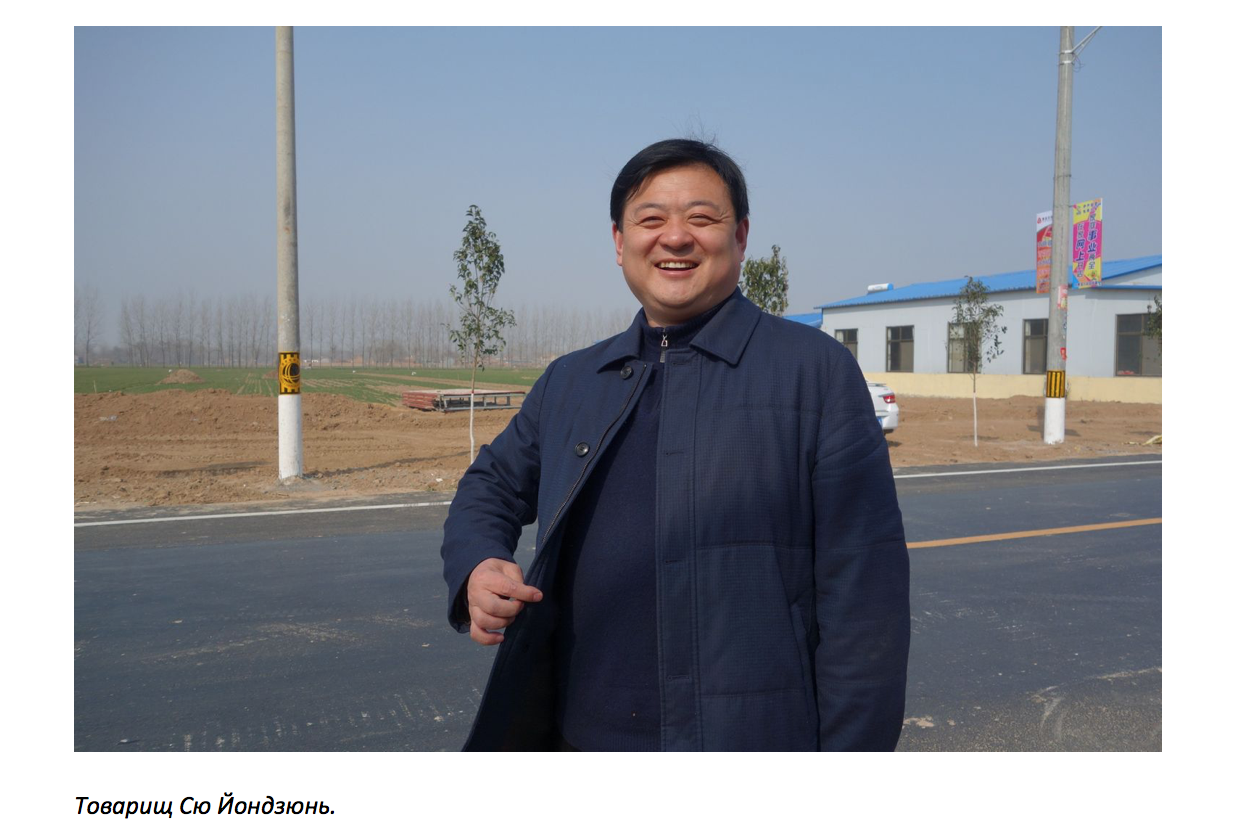
Today the village and the surrounding area are one of the main places of production of specific products - acting and dance costumes. Half of the population of 45,000 people is engaged in the manufacture or sale of all kinds of costumes, ranging from outfits to cinema villains and ending with cute versions of snakes, crocodiles and monkeys. Products are sold through the largest Chinese online store Taobao, owned by the corporation Alibaba.
In 2016, Danji himself sold suits for 1.8 billion yuan ($ 26.2 million). And the whole district, according to some estimates, sold about three times more. This is about 70% of the costumes market on Taobao. In the village of Jinlu, which began the development of the e-commerce industry, 280 households out of 306 are engaged in trading on Taobao. The rest simply cannot work for one reason or another.

Today, the creation of "Taobao villages" is one of the priorities in the national policy of rural development and poverty eradication. Vice Premier Zhang Gaoli, former Party Secretary of Shandong Province and one of the most influential Chinese officials, visited Danji at the end of 2015 and noted the contribution of the village to poverty alleviation.
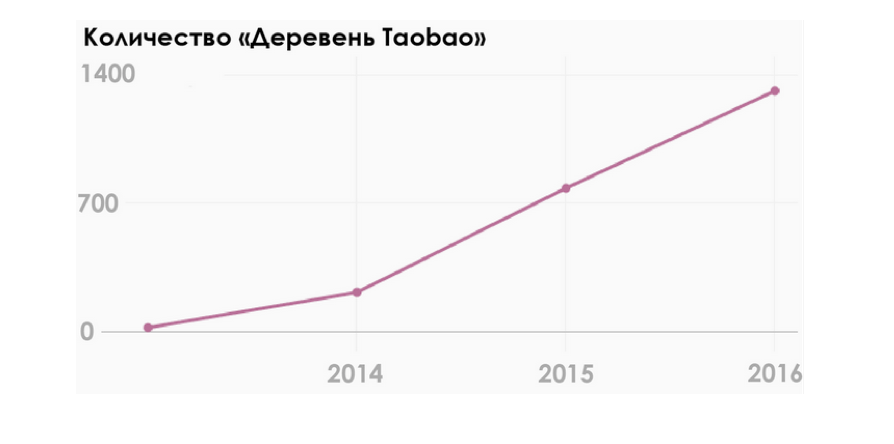
In November 2016, the State Committee to Combat Poverty, together with 16 ministries, issued recommendations on the massive development of e-commerce in rural areas.
By 2020, run-down districts should quadruple sales. Across the road in front of a group of private factories stands a building on which is written in large red letters:
“Thanks to Taobao, you can make your life better. E-commerce is paving the way for happiness. ”
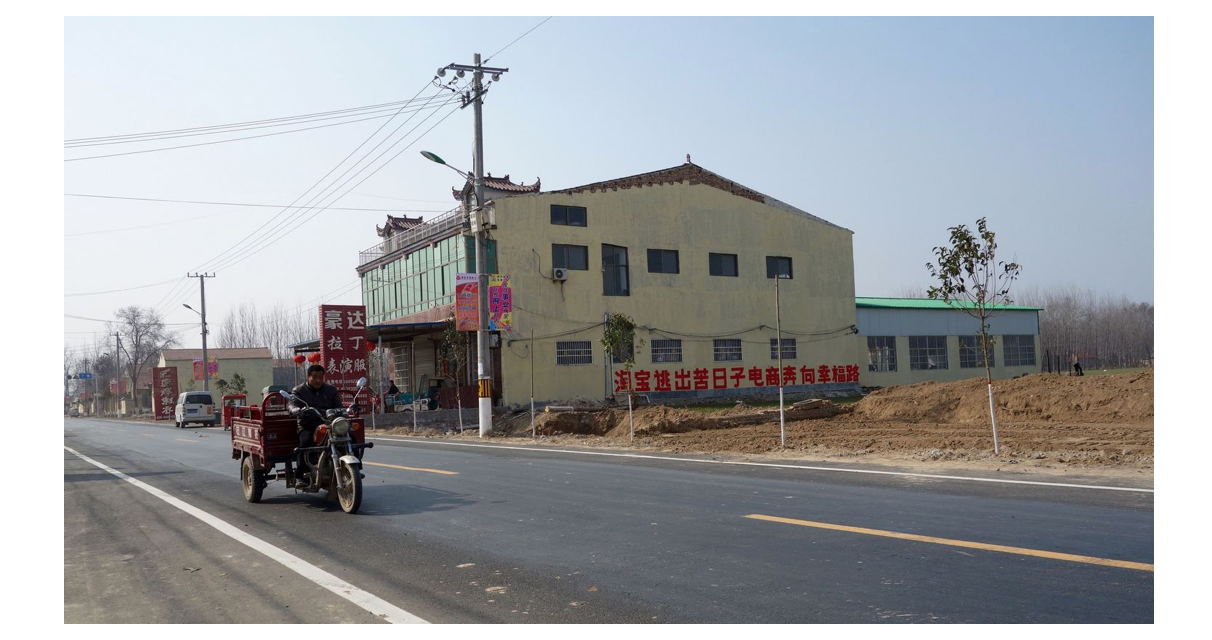
Chinese President Xi Jinping promised to rid the country of poverty by 2020, putting his reputation on engaging everyone in the construction of a “moderately prosperous society.” According to official statistics, today in China there are about 50 million people below the poverty line. This amount is calculated on the basis of the minimum income of 2300 yuan in the prices of 2010 (today, about 3000 yuan = 24,980 rubles). Officials hope to raise the minimum income to 4,000 yuan (33,300 rubles) by 2020.

Fast growing city
The small hangar-like factory of Dinh Peilin is located on the edge of its land plot in the village of Dinglou. It faces the newly laid road. In one room, a couple of middle-aged women iron the suits of military nurses from the Second World War with irons. They are intended for a historical film dedicated to the struggle of the Chinese against the Japanese occupation. Previously, women were engaged in the cultivation of their land nearby. And now they have found a better job and much closer to home.
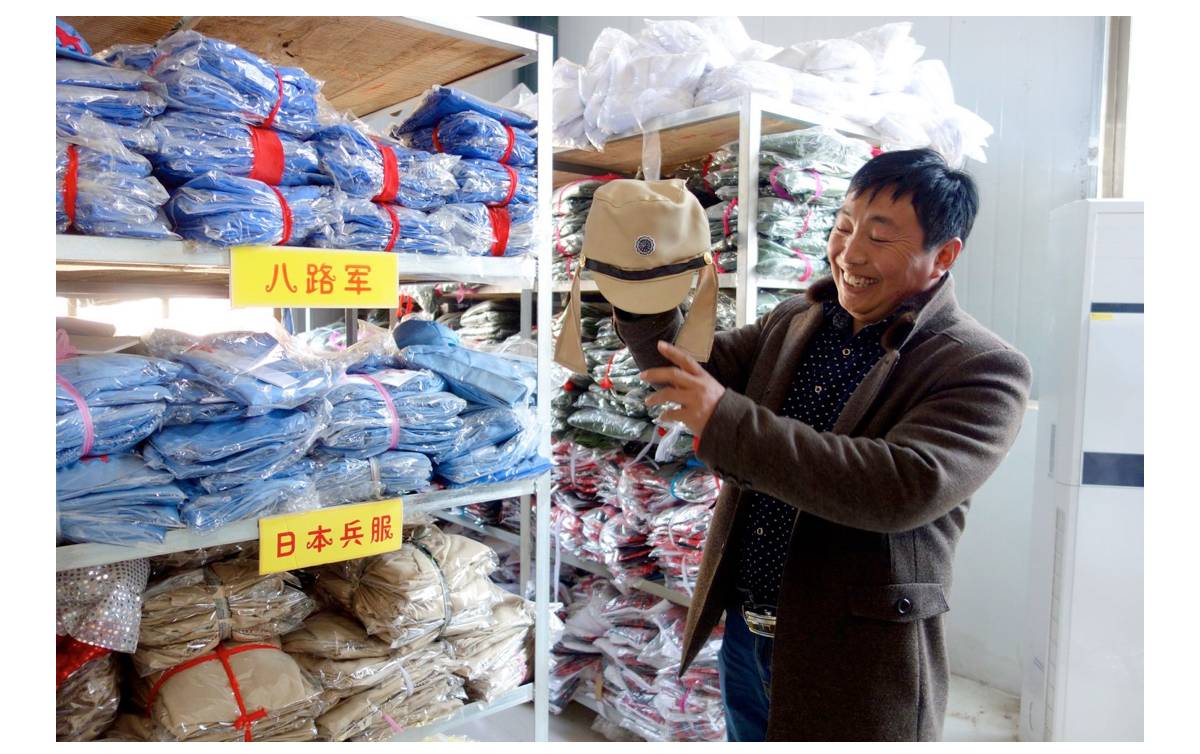
Most adult residents never left their village. Ding, a thin man of 60, in big glasses, finished school and became a teacher. He taught mathematics, writing and literature, but his salary was very low. After 13 years of working as a teacher, in the mid-1980s, he found another occupation. An artist from a neighboring village painted background canvases for photo shoots, but was too busy to sell them. Ding and his relative started going home and offered backgrounds. Then he gradually switched to costumes for photography, and then to costumes for performances. In this area there were more buyers. Around 2013, only Ding and several other households were engaged in some kind of business besides natural management.
The new party secretary, Xu Yonjun, saw the possibility of development. The roads were too bad for truck deliveries, so he took the initiative. Comrade Xu asked for the help of other local officials, and they jointly put the roads in order. They laid a fiber - “the Internet is faster than in Shanghai” - and then Xu wrote an open letter in which he invited college graduates and labor migrants who had left for the cities to return to the village.

As part of the state program to combat poverty, the village administration sponsored e-commerce and clothing training, offered low-interest loans, and encouraged successful businessmen to hire the poorest locals. According to a study by Alibaba, in less than four years, 6,300 people from Danji and the counties officially ceased to be considered poor thanks to online trading.

Alibaba claims that today there are 18 villages across the country, which used to be below the poverty line, today they annually sell goods for a total of 10 million yuan ($ 1.45 million). The total turnover of another 200 villages, which were considered poor according to the increased minimum income, approached this value. The villages of Pinh County, Hebei Province, a few hundred kilometers north of Danji, were also officially considered poor.
Today , children's bicycles are mass produced there. In one of the villages in the south-west of Yunnan province, representatives of the national minority of Bai sell hand-made silver products , and in 2015 they sold goods worth 19 million yuan through Taobao.
Thanks to Xu's efforts, Danji village flourished, raising its status among local residents to incredible heights. Xu insists that this experience can be applied anywhere. “In each locality it is possible to produce some unique goods. The main thing is to give the opportunity to sell them online. ”
"Moderately successful"
It is well known that it was thanks to the economic development of China over the past 30 years that the global level of poverty has noticeably decreased. Understand this in China. The former deputy chairman of the Communist Party's China Rural Development Working Group said in 2016:
“If by 2020 we still have many inhabitants below the poverty line, this will reduce the quality of life of a moderately prosperous society.” Our citizens and the world community will doubt us. If we can raise the level of welfare to the target level by 2020, this will demonstrate to the whole world the leading role of the party and the advantages of Chinese socialism.

To the appointed deadline is only a few years. In 2016, the central government increased its poverty alleviation spending by 43%, to more than 66 billion yuan. The provincial administrations added another 40 billion. In 2013, a national campaign to combat poverty began, within which systematic work began to identify areas below the poverty line and develop targeted programs for their economic development.
At the end of 2016, a five-year development plan was adopted, prescribing the targeted development of 128,000 villages officially recognized as the poorest. Provides for the responsibility of the central and local offices for poverty reduction, which tied an assessment of the effectiveness of the work of officials.
Alibaba also offered its help. Today, it offers four development programs to rural areas. The main focus is on the central and western regions of the country, where Alibaba has invested 10 billion yuan in the construction of 100,000 Taobao service centers, the development of logistics infrastructure and the training of local people to get Taobao to market as soon as possible. The central government has signed an agreement with Alibaba and Jingdong to create another platform for the development of electronic commerce in poor areas of the country.
In 2010, Ant Financial - the financial division of Alibaba - launched a small business microfinance program. And over the years, Ant Financial has issued loans worth four times more than Grameen Bank for 39 years.
Reversal of brain drain
Despite optimism on the ground and a high level of government support, many districts steeped in poverty find it hard to fit into the e-commerce boom. According to some observers, Danji was an advantage - the village is located on a plain, where you can easily build roads and the necessary infrastructure.

In many areas of China, economic growth is hampered by remoteness of settlements and features of mountainous terrain. According to Alibaba data from more than 1,000 "Taobao villages", only 25 are located in remote areas. Somewhere it is possible to figure out how to create a distribution system and logistics despite the difficult climate and landscape, but in most cases even a high level of support does not help.
Today, China is making great efforts to transform villages from poor communities into production centers at the national level. But to successfully accomplish this task, coherence will be required at all levels of the bureaucracy and business.
An important problem is the outflow of the able-bodied population from poor areas, which reduces the already meager economic base. The development potential of regions does not depend on the quantity, but on the quality of the population.
Today, China is experiencing a boom in industrial development in rural areas. Community-based village and village enterprises provided employment growth, received support from local administrations, and in the 1980s and early 1990s, consumer demand was so low that it was possible to make huge profits and create millions of jobs. It was thanks to community-based enterprises that at that time partly managed to stop the “brain drain” from rural to industrial areas.
Xu wrote his open letter inviting labor migrants and college graduates to Dantzin in 2015. It was an additional incentive: from the start of the Taobao boom, about 5,000 people returned from Danobi, including hundreds of college graduates. But the village still needs skilled workers. “All returning college graduates have been successful; now we need to expand.”
Din Peyyu offers yesterday’s schoolchildren from neighboring districts and cities shelter and food. Prepared several computers. But it’s not so easy to attract people to the village. In the hottest months of sales, the largest enterprises of the village are overloaded with orders and transfer part of them to the enterprises of other provinces. It is difficult to solve, but an enviable problem, the occurrence of which no one could have imagined several years ago.
With the growth of sales, residents begin to make plans to expand the business. In the village will soon lay the third industrial park for production facilities and sales offices. Today, Danji starts selling costumes abroad: to Malaysia, Vietnam and other countries of Southeast Asia. The plans include improving the quality of products in order to become competitive in the European and American markets.

ZY In conclusion, I would like to express the hope that something similar will become possible in our country. Against the background of the increasing penetration of high-speed Internet in the regions and the growing popularity of platforms and formats based on e-commerce, the appearance of high-tech villages Ozon, Tinkoff, Yulmart or Exist in Russia is not excluded.
Source: https://habr.com/ru/post/325114/
All Articles